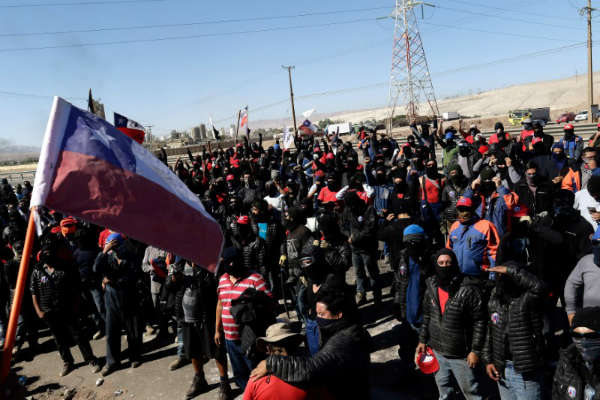Workers walked off job Feb. 9

ANTOFAGASTA (Reuters) — The striking union at BHP Billiton's Escondida copper mine in Chile, the world's largest, will meet with the company on Wednesday to resume conversations, both parties said on Tuesday night.
In a letter sent to the members of the 2,500-member Escondida union, labour leaders said they would meet with the company in the hopes of putting an end to the 41-day strike, one of the longest in the history of Chilean mining.
A company spokesman confirmed to Reuters that a meeting would take place on Wednesday, adding that the time of the meeting would be coordinated on Wednesday.
"It's possible that the solution to this negotiation could take several days more, so as a consequence, every member must keep alert for all scenarios," the union leadership said in a letter sent to the rank-and-file and seen by Reuters.
Workers at Escondida walked off on Feb. 9, and copper production at the mine has been stopped since, sending global copper prices higher amid supply concerns.
Talks have been tense since then, and various attempts to return to the table have failed. The two parties returned to the table for the first time in weeks on Monday and agreed to hold further conversations.
Throughout the process workers have maintained three key demands: that the benefits in the previous contract not be reduced; that shift patterns not be made more taxing; and that new workers get the same benefits as those already at the mine.
In the Tuesday letter, the union leadership reiterated those three demands.
The union also reiterated that it was authorized to invoke Article 369 of Chile's labour code if it deems appropriate, as union members voted to give labour leaders that authority on Sunday and Monday. Under that provision, the current negotiations would stop, and the workers would go back to work for 18 months under the previous contract.
The workers say that would allow them to start negotiations again under new labour laws set to go into effect in April, strengthening their hand.
Escondida is majority controlled by BHP, with minority participations by Rio Tinto and Japanese companies including Mitsubishi Corp. It produced slightly over 1 million tonnes of copper in 2016.




